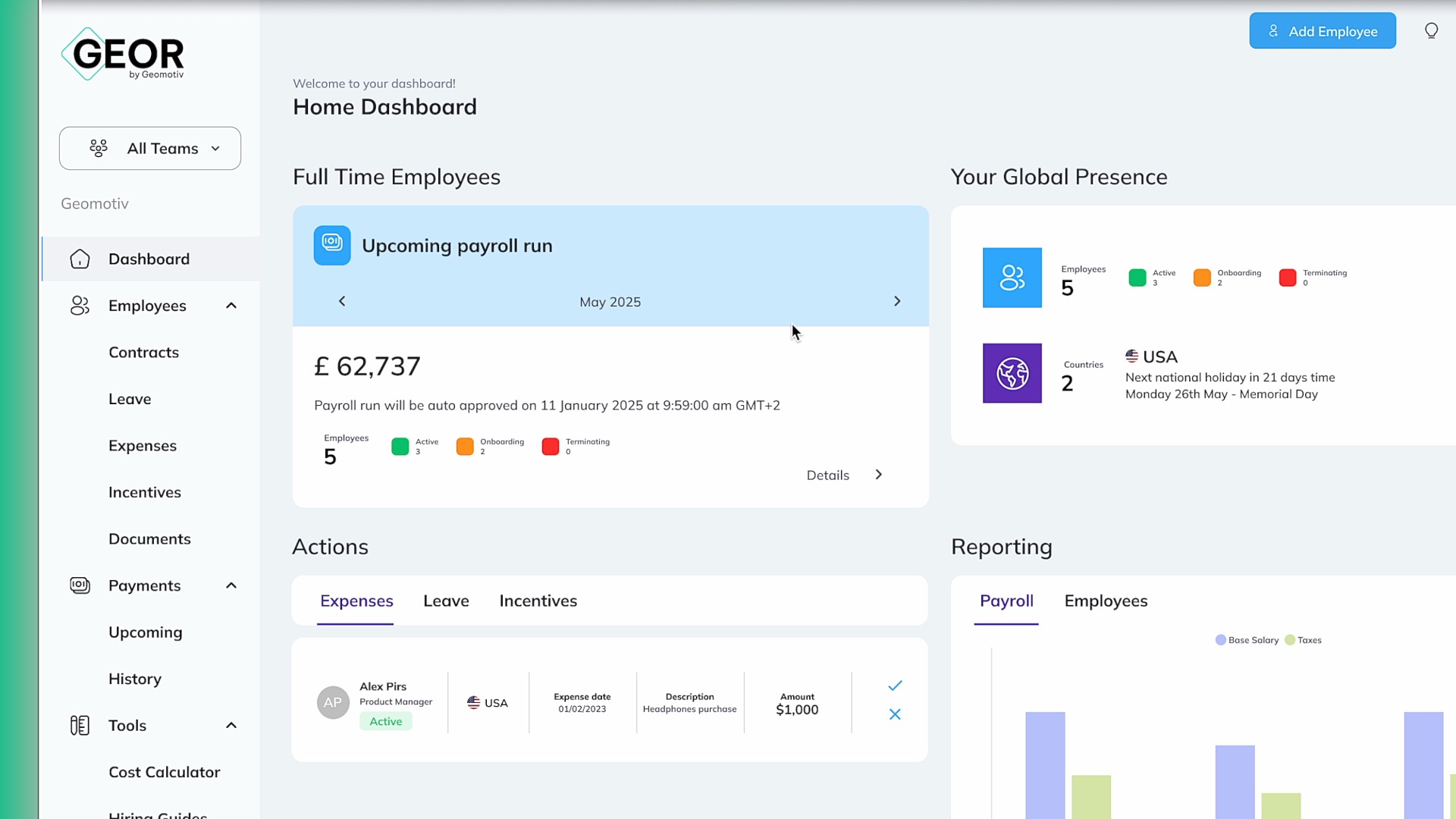- Quick onboardingDevelopers and DevOps hired within 7 days.
- Error-free payrollEliminate tax mistakes and risks.
- State-specific complianceExpert management of labor laws across tech hubs.
- IP protection and secure data handlingEssential for tech innovation.
- Custom employee benefitsHealth insurance, equity plans, and more to retain talent.
- Scalable for hyper-growthWhether you’re hiring 5 or 500 engineers, we scale with you.
IT payroll solutions across the USA
Build and scale your U.S. tech team with compliant, efficient payroll solutions across all 50 states—no need for a local entity.

Tailored payroll solutions for tech
GEOR delivers reliable, fully compliant payroll in the USA for IT startups and enterprises.

United States of America
(USA)
$29 trillion
English
$ (USD)
$65k–$160k/year
Payroll taxes in tech
Federal tax
Progressive rates from 10% to 37%
State tax
Varies by state from 0% to 13.3%
Social Security and Medicare
- Employers and employees each pay 6.2% and 1.45%.
- Additional 0.9% for high-earners.
FUTA (Unemployment)
6% on the first $7k of wages.
Do you have a specialist in mind to pay in the United States?
Let us help you.
Tax reporting
- W-2: annual wage and tax statement for employees.
- 941: quarterly federal tax returns.
- 940: annual FUTA return.
IT labor regulations snapshot
Wage
Entry-level tech roles must be paid state or city minimum wage.
Overtime pay
Non-exempt employees are entitled to 1.5x pay.
Payroll cycle
- Biweekly
- Semi-monthly
- Weekly, in some states, for non-exempt employees.
Pay stub
Paper or digital

Common employee benefits
- Health insurance (medical, dental, vision)
- 401(k) retirement plans with employer match
- Paid time off (PTO) and parental leave
- Wellness programs
Payroll
in the United States
Tech companies must distinguish exempt from non-exempt roles and follow state wage, overtime, and tax laws.
Understanding the difference between exempt and non-exempt employees is crucial for tech startups and corporations to ensure adherence to U.S. labor laws, particularly the Fair Labor Standards Act (FLSA).
Worker classification in the U.S. must comply with the laws of the state where the contractor resides, not just where the company is headquartered. Misclassifying freelancers or independent contractors can lead to severe penalties, particularly in states like California with stricter regulations under the AB5 Law.
The ABC Test in California presumes that workers are employees unless the company proves the contractor:
A) Works independently from company control.
B) Performs work outside the company’s usual course of business.
C) Operates an independently established business.
Remote IT contractors, such as software developers and DevOps engineers, who work long-term on core company projects, often fail the ABC Test, making them more likely to be classified as employees under state law.
Equity compensation refers to non-cash benefits, such as Stock Options (ISOs/NSOs) and Restricted Stock Units (RSUs), offered by tech companies to attract and retain talent. These forms of compensation provide employees with ownership stakes but come with complex tax requirements.
Equity compensation must be reported on payroll when vested or exercised.
Tech organizations with remote teams must comply with labor laws in the employee’s state, not just the company’s headquarters.
A pay stub is a document provided to workers with each paycheck, detailing their earnings and deductions for a specific pay period.
In the United States, pay stubs are not mandated federally but are required in most states, either in paper or digital form. States like California impose strict penalties for missing or inaccurate details.
For a precise record-keeping, the document should include:
Certain states, including Colorado, California, and New York, mandate that employers disclose salary ranges in job postings. IT companies must ensure compensation consistency across states or provide clear justification for any pay differences.
Termination pay timelines vary by state:
States like New York and California enforce stricter paid family leave and sick leave mandates than federal law, requiring employers to offer additional leave benefits to remain compliant.
Challenges of managing U.S. payroll
Managing US payroll internally presents several challenges for software companies, often leading to costly risks.
Complex regulations
Failure to adhere to state-specific laws, such as wage transparency requirements, can result in penalties.
Fast-paced scaling
The need to onboard developers, engineers, and designers quickly makes oversight challenging.
Classification errors
Misclassifying developers as exempt or non-exempt employees creates legal vulnerabilities.
Manual paycheck mistakes
Errors in overtime calculations for hybrid roles or diverse teams can lead to audits.
Pay stub errors
Inaccurate reporting of stock compensation and other earnings creates gaps in pay stub accuracy.
IP protection risks
Startups managing proprietary code or products face heightened dispute risks without robust payroll oversight.
Remote and hybrid teams
Tax laws for remote workers across multiple states add management complexity.
Employee retention
Attracting and retaining tech talent requires competitive compensation, accurate payroll, and tailored benefits.
Payroll and tax made simple
Here’s why GEOR is the best United States’ payroll partner for IT companies.

GEOR manages federal (IRS) and state tax registrations to simplify US payroll processes for your company. We structure contracts carefully to reflect true independent contractor relationships.
We regularly review remote employee handbooks for state-specific policies and properly classify software engineers, contractors, and full-time staff. GEOR uses state-specific onboarding checklists to ensure adherence to law.
We confirm workforce meets both salary and duties tests for exemption and handle automated USA payroll processing, including tax deductions and required reporting (W-2, W-3, 941, 940).
We help you stay compliant with federal and state income taxes, manage multistate tax withholdings.
Our team conducts regular 409A valuations with certified professionals and offer tax education or consultations for employees receiving equity.
GEOR offers competitive perks like 401(k), equity, and health insurance.
GDPR, CCPA, and SOC 2-compliant systems protect sensitive payroll data.
Explore Our Payroll Platform
See how the Global Employer Of Record platform helps you seamlessly manage your global workforce — from hiring and compliance to payroll and employee requests — all in one place.

Tailored for winning
Achieve your next big win with our in-depth knowledge of the tech industry’s requirements.
A seamless payroll solution with no minimum commitment. Simplify your United States’ IT payroll management with GEOR’s trusted services, tailored for software companies operating across the United States of America.
- Onboarding within 1 week
- Payroll processing and tax deductions
per employee/ month.
A starter’s package.
No hidden fees or extra charges.
Start U.S. IT payroll today
Leverage GEOR’s expert-driven USA payroll processing solutions to ensure efficiency and growth for your tech team.

Client Feedback
Competitor comparison
How GEOR outperforms other payroll companies in the US.
| Feature | GEOR | Deel | Lano | PGC Group |
|---|---|---|---|---|
| Compliance focus | Expert-led | Automation-first | Limited support | Compliance-led |
| Payroll flexibility | Fully flexible | Standardized | Less customization | Custom plans |
| Industry expertise | IT focus | Generalized | Limited focus | Traditional approach |
| Support | Dedicated HR | Limited | Limited | Full service |
Future-proof your tech payroll
Step confidently into the future of U.S. payroll with GEOR. Adhere to evolving federal and state tax regulations while building a high-performing team. Deliver accurate, timely payroll in the USA, tailored to their labor laws. Offer dynamic benefits that attract and retain top tech talent.
Simplify U.S. paychecks with GEOR
Let GEOR handle the complexity while you focus on growing your business.
FAQs
Unlike automated platforms, GEOR combines cutting-edge technology with dedicated human support, offering personalized service and proactive legal and HR management.
Our company serves as your Employer of Record, managing payroll and taxes, allowing you to hire and pay U.S. employees without setting up a local legal entity.
A payroll company in the US like GEOR ensures legal and tax experts stay updated on all U.S. federal and state labor laws, ensuring correct paychecks, pay stubs, tax and equity filings, and worker classifications across every state.
We handle all federal and state wage taxes, including Social Security, Medicare, income tax withholdings, unemployment insurance, and state-specific tax obligations.
We manage equity plans, stock options, performance-based bonuses, and other compensation models essential for attracting and retaining tech talent.
Our team efficiently handles salaries for distributed teams across all 50 U.S. states, managing tax and benefits for seamless operations.
Yes, a company like GEOR streamlines payments for both full-time employees and independent contractors, ensuring accurate payments, tax deductions, and benefits management for hybrid teams.
Yes, we enable you to outsource tech staff. We onboard your engineers and developers in as little as 7 days, leveraging our robust infrastructure and legal expertise.
No, with our payroll solutions, you don’t need an in-house HR team. We manage all aspects of wages and benefits on your behalf.
GEOR complies with GDPR, CCPA, and SOC 2 security standards, using encryption and strict access controls to ensure all data is securely managed.
It depends on the type and complexity of work they perform. Manual and QA testers are typically non-exempt unless involved in test automation, coding, or designing complex automated testing systems. IT support roles classify as exempt when they manage systems design or critical infrastructure.
Looking for more employment models?
We deliver end-to-end employee and contractor management services, covering various hiring requirements in the USA.
Отправляя данную форму вы подтверждаете свое согласие с Политикой конфиденциальности











